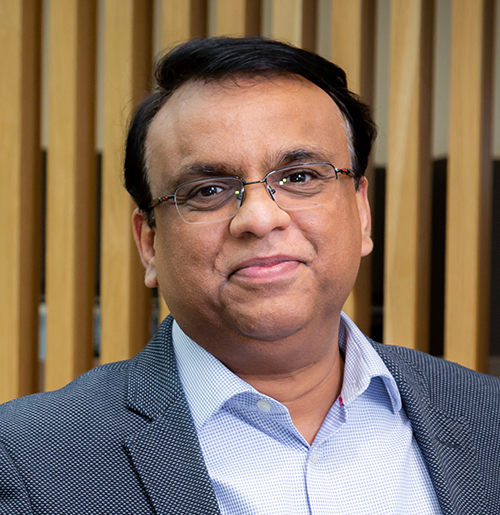On the lighter side of things, we ask the industry experts what makes them tick.

What would you describe as your most memorable achievement?
Over the last three-plus decades, I have been lucky to work across several industries, countries and cultures. Because of this, I have gained rich experience across telecoms, professional services, space, consulting, banking, manufacturing, retail and public services. I have fond memories from these sectors; all learnings are part of my carefully curated playbook. Anyone aspiring to apply knowledge and experience from one industry to another has to take a measured approach to opportunity and risks. If I were to highlight a few memorable achievements, they would include:
- Establishing the first mobile networks across several markets
- Designing an innovative Shared Services Centre for a multi-billion-dollar giant
- Network transformation for the world’s largest mobile network operation
- Scaling mobile operations at Vodafone India for 200 million-plus customers – the first Internet connectivity for millions
- Building a technology group (150 strong) and transformational tech stack for a space startup
What first made you think of a career in technology?
I grew up in an era where information was sparse, knowledge was found through books or newspapers, and it was deemed prestigious to be a doctor or an engineer. I found that becoming a doctor would be an honoured profession, but also realised that it would take 15 years to achieve. The choice was clear: become an engineer instead and make a difference. I was lucky enough to join the telecoms industry, where I could contribute to society by providing connectivity. I have played a small part in empowering our communities with information and decision-making while on the move. With a passion for bridging the digital divide, I am now focused on helping remote African communities connect over satellite broadband.
What style of management philosophy do you employ with your current position?
As a Chief Technology Officer at Avanti Communications, I aim to connect the unconnected and empower individuals, communities, businesses and governments. This challenging ambition requires creative leverage of technology, partnerships, skills, processes and cultures. We operate and service in multiple countries, so it’s critical to understand local requirements for the best customer experience. I transition between different leadership styles to ensure effective outcomes. I prefer to be strategic, democratic and transformational in my outlook and leverage other management styles based on circumstances and demand. I believe in a mature, capable, integral and high-performing leadership model to empower the team, resulting in excellent outcomes.
What do you think has emerged as the technology trend of 2023 and why?
We are in an era where hardware, software and services are evolving at an unprecedented pace and are underpinned by ubiquitous connectivity between humans, devices and machines. We are emerging from traditional software development to generative AI and are beginning to understand opportunities and threats. CXO’s resistance to the cloud is disappearing fast, and cloud-first strategies are becoming mainstream. Terrestrial broadband connectivity is complemented by new space, and competitive business models are evolving into ‘coopetition’ models. Secure marketplace, tailored solutions and high-quality service offerings will be crucial to success and market leadership.
What do you currently identify as the major areas of investment in your industry?
In my world of new space, key investment trends include the scale manufacturing of small satellites, launch capability transformation for scale and cost, massive low earth constellations buildout, experiments to trump the direct-to-device connectivity challenge, in-orbit servicing and clean space management technologies.
The industry has witnessed large-scale consolidation across major businesses and startups with an ambition to drive scale growth and portfolio diversity. Developing solutions for continental and country-specific challenges is vital as significant capacity and capability evolve. The traditional approach of satellite connectivity as a last resort is now a thing of the past, and customers are demanding new space connectivity for strategic value.
Satellite service providers have quickly embraced the tried and tested telecoms industry mantras, investing significantly in products, solutions, resource upskilling and scale operations delivery.
How do you deal with stress and unwind outside of the office?
Everyone has their method of dealing with complexities at work and home. Every day brings its own set of happiness and sorrows. Transforming a technology organisation and stack for new space is demanding and 24/7. I look for moments in the day for relaxation and leverage a combination of unplanned interactions, social media, beyond-work connections, research, long drives and weekend midday naps. Keeping a calm mind while handling complex situations is vital, and leveraging the best experts helps me avoid unnecessary stress. I spend considerable time with my family; we enjoy gaming, Bollywood, dinner dates and debates on current affairs. Growing up in a cricket-loving nation, I would not surprise anyone if I said I could watch Cricket all day, any day.
If you could go back and change one career decision, what would it be?
I have been lucky with my career choices and often gained significantly from a pragmatic approach to adverse circumstances. I crave new challenges and find myself looking for newer ones once I have mastered them. Over the years, my experiences in the infrastructure, services and consulting domains have broadened my horizons. If I were to highlight one key area where I could have invested more, it would be more profound software development and a stint with a software company.
What are the region-specific challenges when implementing new technologies in Europe?
New technology development in Europe is complex and challenging for various reasons – including funding, fragmentation, complex regulatory framework, cultural and language diversity, bureaucracy, skills and resource availability. Fast-paced private financing driven by quality resourcing and research is readily available across North American markets. A larger single market and higher buying propensity contribute to ease of funding in North America, which makes it more of a challenge for Europe. Several European Agencies are now driving investments in new space and consumer products.
What changes to your job role have you seen in the last year and how do you see these developing in the next 12 months?
In the service provider space, traditional CTOs would focus on launching new satellites, building ground stations and overall be heavily infrastructure-focussed. With new space capability and capacity, the focus is fast evolving to include solution development for customer-specific challenges, integrating and collaborating with partners, understanding country dynamics and culture, compliance with telecom regulations, building a team that speaks customer language, scaling infrastructure and significantly securing the business from cyber-risks.
What advice would you offer somebody aspiring to obtain a C-level position in your industry?
Space is an exciting frontier and offers immense opportunity for humanity. Over the next several decades, we will potentially realise more accessible space travel and enhanced densification with thousands of satellites. Governments and commercial entities are keen on opening new frontiers like Space Cloud and manufacturing in space.
While C-level competency and capabilities needs vary from company to company, several common traits are essential for success. One must bring in strategic, tactical, commercial, financial, people, technology, product, operations, compliance and risk management skills. Above all, CXOs need to serve with a smile, be passionate about their vision and lead from the front.
Click below to share this article

